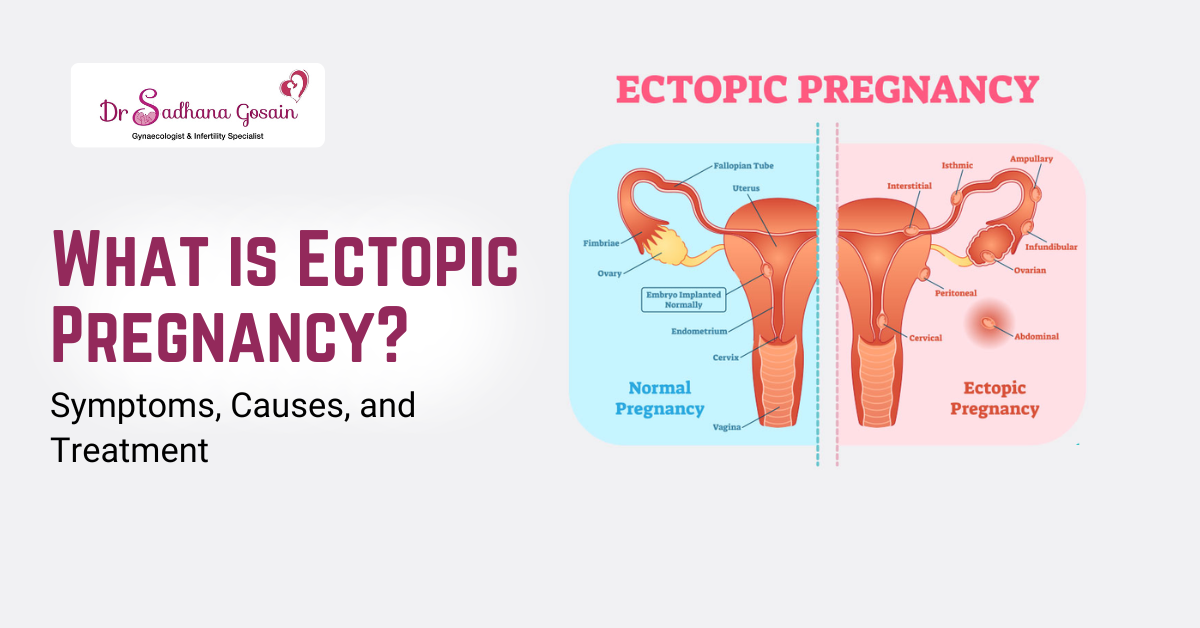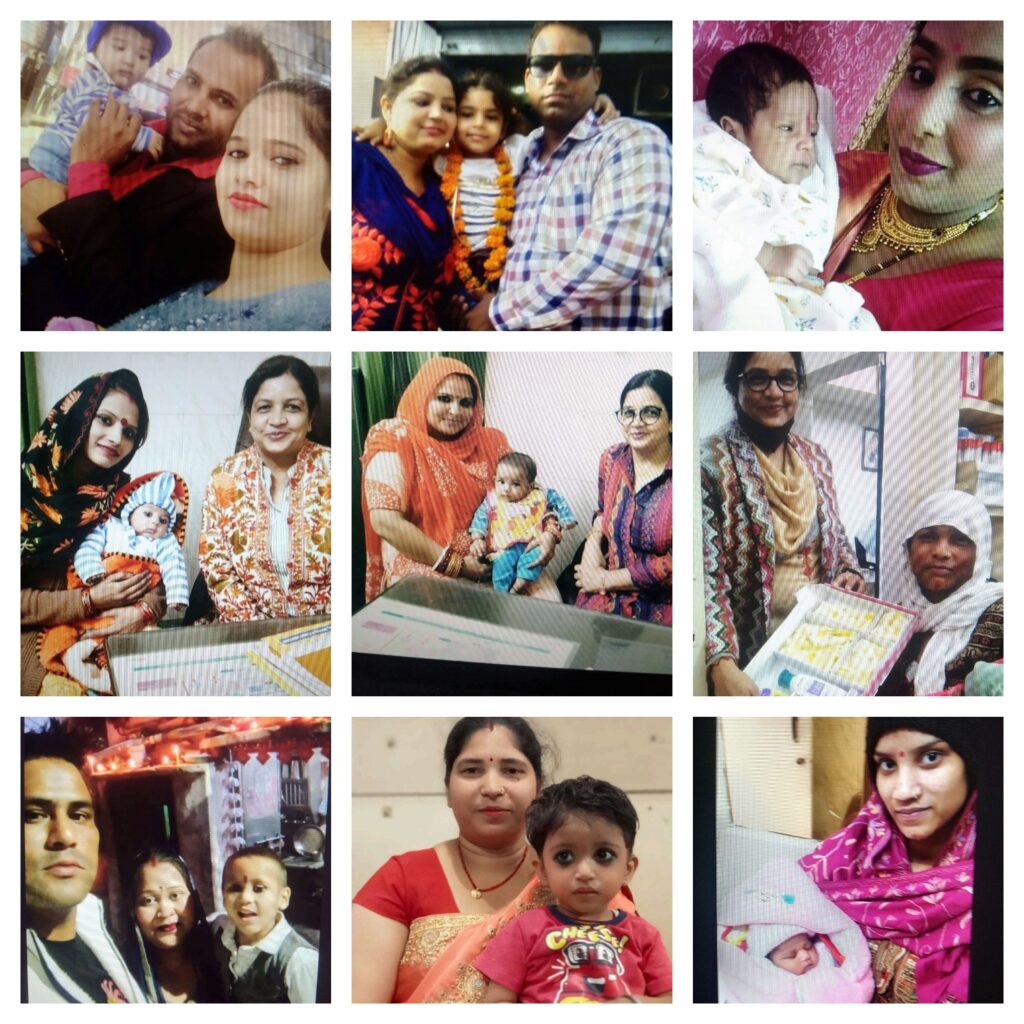What is Ectopic Pregnancy? Symptoms, Causes, and Treatment
Pregnancy is a life-changing event that brings joy, excitement, and hope. However, it is essential to understand that not all pregnancies are typical. In some cases, women may experience a condition known as ectopic pregnancy. This condition can pose significant health risks to the mother if left untreated, so it’s crucial to be aware of its symptoms, causes, and available treatments.
In this article, we will explore what is ectopic pregnancy, its causes, symptoms, risks, and treatments. If you are in search of expert advice or treatment options, you can consult a Gynaecologist in Delhi – Dr. Sadhana Gosain, who specializes in fertility and pregnancy-related concerns.
What is Ectopic Pregnancy?
An ectopic pregnancy occurs when a fertilized egg implants itself outside the uterus, most commonly in one of the fallopian tubes. In a typical pregnancy, the fertilized egg travels through the fallopian tube and into the uterus, where it attaches and develops into a fetus. However, in an ectopic pregnancy, the fertilized egg cannot properly implant in the uterus, which leads to the development of the pregnancy outside of it, usually in the fallopian tubes. Though rarer, ectopic pregnancies can also occur in the ovaries, cervix, or abdominal cavity.
Ectopic pregnancy is a serious condition because the developing embryo cannot survive outside the uterus. Furthermore, as the pregnancy progresses, it can cause the fallopian tube to rupture, leading to heavy bleeding and potentially life-threatening complications for the mother.
Causes of Ectopic Pregnancy
While the exact cause of an ectopic pregnancy may vary from woman to woman, several factors can increase the risk of developing this condition. These include:
-
Damaged Fallopian Tubes: A history of pelvic inflammatory disease (PID) or sexually transmitted infections (STIs) can cause scarring or damage to the fallopian tubes, which can obstruct the passage of the fertilized egg.
-
Previous Ectopic Pregnancy: Women who have experienced an ectopic pregnancy before are at a higher risk of having another one.
-
Endometriosis: This condition, where tissue similar to the lining of the uterus grows outside the uterus, can affect the fallopian tubes and increase the likelihood of an ectopic pregnancy.
-
Use of Fertility Treatments: Women undergoing in vitro fertilization (IVF) or using fertility drugs are at a higher risk of an ectopic pregnancy, though the risk remains relatively low.
-
Age: Women over 35 may have a slightly higher risk of developing ectopic pregnancies.
-
Smoking: Smoking can damage the fallopian tubes, making it more difficult for the fertilized egg to reach the uterus.
-
Contraceptive Use: Though rare, an ectopic pregnancy can occur in women who are using birth control methods like intrauterine devices (IUDs) or tubal ligation.
Symptoms of Ectopic Pregnancy
Early detection of ectopic pregnancy is crucial for preventing complications. Some of the common symptoms include:
-
Abdominal Pain: The most common symptom of an ectopic pregnancy is pain in the lower abdomen or pelvis, often on one side. This pain can vary in intensity and may become sharper as the pregnancy progresses.
-
Vaginal Bleeding: Light vaginal bleeding or spotting may occur, although some women may experience heavy bleeding. This bleeding can be mistaken for a normal period.
-
Shoulder Pain: If the fallopian tube ruptures, it can lead to internal bleeding, which can irritate the diaphragm. This can result in sharp shoulder pain, especially when lying down.
-
Dizziness or Fainting: If the ectopic pregnancy causes heavy bleeding, it can lead to symptoms of shock, such as dizziness, fainting, or lightheadedness.
-
Painful Urination or Bowel Movements: Some women may feel discomfort while urinating or having bowel movements.
If you experience any of these symptoms, especially if they are severe, it’s crucial to seek medical attention immediately.
Diagnosis of Ectopic Pregnancy
If a doctor suspects an ectopic pregnancy, they will perform a series of tests to confirm the diagnosis. These tests include:
-
Ultrasound: A pelvic ultrasound is usually the first test performed to determine the location of the pregnancy. However, if the pregnancy is too early to be detected, an ultrasound may not immediately reveal the ectopic pregnancy.
-
Blood Tests: The doctor may order blood tests to measure human chorionic gonadotropin (hCG) levels. In a normal pregnancy, hCG levels increase rapidly. In an ectopic pregnancy, these levels may rise more slowly than expected.
-
Pelvic Examination: The doctor may also perform a pelvic exam to check for tenderness or swelling in the abdominal region.
Treatment for Ectopic Pregnancy
Once diagnosed, treatment for ectopic pregnancy is necessary to prevent serious complications. The treatment plan will depend on the size and location of the ectopic pregnancy, as well as the health of the woman.
-
Medication: If the ectopic pregnancy is diagnosed early and the fallopian tube hasn’t ruptured, medication may be used to stop the pregnancy from progressing. The most common medication is methotrexate, which stops the cells from dividing and can dissolve the ectopic pregnancy.
-
Surgical Intervention: If the pregnancy is more advanced, or if there is a risk of rupture, surgery may be necessary. The surgeon may remove the ectopic pregnancy while preserving the fallopian tube, if possible. In some cases, the tube may need to be removed if it is damaged.
-
Expectant Management: In some rare cases, if the ectopic pregnancy is small and the woman is not experiencing severe symptoms, doctors may recommend monitoring the situation closely to see if the pregnancy resolves on its own.
Risks and Complications of Ectopic Pregnancy
The main risk of ectopic pregnancy is rupture. If the pregnancy continues to develop in the fallopian tube, it can cause the tube to rupture, leading to severe internal bleeding. This is a medical emergency that requires immediate attention. Without proper treatment, an ectopic pregnancy can be life-threatening.
Preventing Ectopic Pregnancy
While it’s not always possible to prevent an ectopic pregnancy, certain measures can help reduce the risk:
- Practicing Safe Sex: Using condoms can prevent STIs that can lead to pelvic inflammatory disease (PID), which increases the risk of an ectopic pregnancy.
- Early Treatment of STIs: Getting treated for STIs promptly can reduce the chances of developing scarring that may damage the fallopian tubes.
- Avoiding Smoking: Quitting smoking may lower the risk of ectopic pregnancy, as smoking can harm the fallopian tubes.
View this post on Instagram
When to Consult a Gynaecologist?
If you experience symptoms of an ectopic pregnancy, such as abdominal pain, vaginal bleeding, or dizziness, it’s essential to see a Gynaecologist in Delhi – Dr. Sadhana Gosain as soon as possible. Early diagnosis and treatment are crucial to preventing complications and preserving fertility. Dr. Gosain’s expertise in fertility and reproductive health can provide you with the right care and support during such challenging times.
FAQ on Ectopic Pregnancy
Q1: How can you tell if a pregnancy is ectopic?
You may experience symptoms like sharp abdominal pain, vaginal bleeding, and dizziness. A doctor will use blood tests and ultrasounds to diagnose an ectopic pregnancy.
Q2: Can an ectopic pregnancy resolve on its own?
In rare cases, small ectopic pregnancies can resolve on their own with expectant management. However, most cases require medical or surgical intervention.
Q3: How is an ectopic pregnancy treated?
Treatment options include medication (methotrexate), surgery to remove the ectopic pregnancy, or expectant management if the condition is mild.
Q4: What are the chances of having another ectopic pregnancy after one?
The risk of having another ectopic pregnancy increases after one, but with proper care and monitoring, many women can have healthy pregnancies in the future.
Q5: Can an ectopic pregnancy affect fertility?
While an ectopic pregnancy can impact fertility, many women go on to have successful pregnancies after treatment. Early detection and proper care can help preserve fertility.
Understanding what is ectopic pregnancy and its associated risks is crucial for all women. If you suspect you may have an ectopic pregnancy or need advice on reproductive health, consulting with a trusted Gynaecologist in Delhi – Dr. Sadhana Gosain can provide you with the expert care you need. For more information on fertility and gynecology services, visit Dr. Sadhana Gosain’s Clinic.



